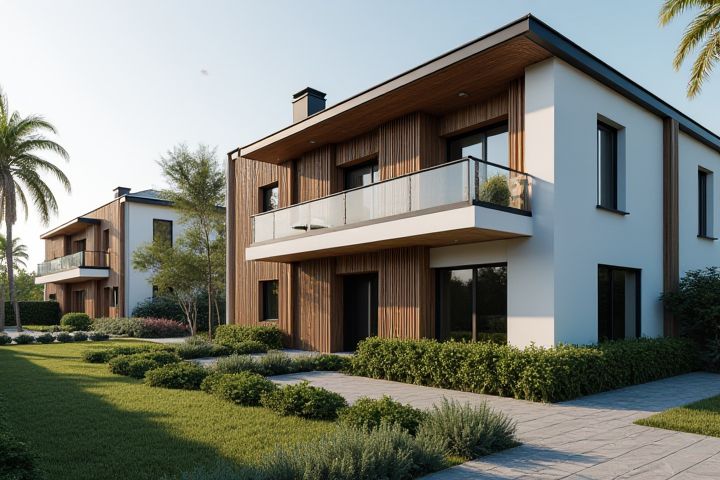
The Nigerian real estate market is experiencing a notable shift towards urbanization, driven by increasing population density in major cities like Lagos and Abuja. You'll find that residential properties are in high demand, particularly affordable housing units, due to a growing middle class seeking homeownership. The commercial real estate sector is also thriving, with a surge in demand for retail spaces and office buildings as businesses expand. Investing in real estate in Nigeria presents opportunities, especially in emerging locations where infrastructure development is underway, enhancing property values. Furthermore, the introduction of technology in real estate transactions is streamlining processes, making property acquisition more accessible for investors.
Urbanization and population growth
Urbanization in Nigeria is rapidly transforming landscapes, with major cities like Lagos and Abuja experiencing significant infrastructure development to accommodate a growing population. This surge prompts increasing demand for residential, commercial, and industrial properties, driving investment in real estate. Population growth, projected to reach over 400 million by 2050, exacerbates the demand for affordable housing, making property development a priority for both government and private sectors. Understanding these trends is crucial for investors and stakeholders seeking lucrative opportunities in Nigeria's dynamic real estate market.
Government housing initiatives
Government housing initiatives in Nigeria are crucial for addressing the nation's burgeoning population and urbanization challenges. With programs aimed at providing affordable housing options, the Federal Mortgage Bank and various state governments are increasing access to financing for low-income families. These initiatives often include public-private partnerships, which enhance investment in residential developments, fostering economic growth. By encouraging sustainable urban planning, these strategies not only promote better living conditions but also stimulate local economies across Nigerian cities.
Rise of mixed-use developments
The rise of mixed-use developments in Nigeria reflects a shift towards integrated living environments that combine residential, commercial, and recreational spaces. This approach fosters community interaction and enhances convenience, catering to urban populations seeking vibrant, multifunctional areas. Notable cities like Lagos and Abuja are witnessing a surge in projects that blend apartments, offices, retail shops, and leisure facilities, promoting sustainable urban growth. As a result, these mixed-use spaces are becoming increasingly attractive to investors and residents alike, driving a dynamic real estate market in the country.
Demand for affordable housing
The demand for affordable housing in Nigeria has surged due to rapid urbanization and population growth, making it a critical focus for real estate developers and investors. Many citizens seek cost-effective options, leading to an increase in initiatives targeting low- and middle-income earners. Government policies and private sector partnerships aim to address this housing deficit by promoting innovative construction techniques and affordable financing solutions. As a potential homebuyer, you may find an array of emerging projects that align with your budget and housing needs.
Impact of economic fluctuations
Economic fluctuations in Nigeria significantly influence real estate trends, affecting property values and investment opportunities. As inflation rates rise, the cost of construction materials increases, leading to higher housing prices. Urbanization drives demand for residential and commercial properties, particularly in major cities like Lagos and Abuja, where the population continues to grow. Understanding these dynamics can help you make informed decisions about property investments that align with current market conditions.
Technology and proptech adoption
In Nigeria, real estate trends increasingly emphasize the integration of technology and proptech solutions, transforming traditional property transactions. Innovations such as virtual tours, blockchain for secure transactions, and data analytics for market insights are gaining traction among developers and investors. These technologies enhance transparency, streamline processes, and improve customer experiences in buying, selling, and leasing properties. As a result, the Nigerian real estate market is becoming more competitive and efficient, positioning itself for growth in a digital age.
Influence of foreign investments
Foreign investments significantly shape real estate trends in Nigeria, driving demand for both commercial and residential properties. In major cities such as Lagos and Abuja, international investors seek opportunities in high-rise developments and luxury housing, reflecting the growing urbanization and middle-class expansion. The Nigerian government's efforts to create a conducive business environment, such as tax incentives and streamlined property acquisition processes, further attract foreign capital. As a result, this influx not only boosts property values but also catalyzes infrastructural growth and job creation across the nation.
Shortage of quality infrastructure
The Nigerian real estate market is currently grappling with a critical shortage of quality infrastructure, significantly hindering growth and development. A lack of modern amenities, reliable transportation networks, and adequate utilities has deterred both local and foreign investments, impacting property values and market accessibility. As urbanization accelerates, particularly in cities like Lagos and Abuja, addressing this infrastructure deficit is essential for enhancing livability and attracting potential buyers. You might find that investing in regions with ongoing infrastructure development can yield substantial returns as improvements boost overall market prospects.
Environmental and sustainability considerations
Real estate trends in Nigeria increasingly emphasize environmental sustainability, with developers adopting green building practices that minimize ecological impact. Innovative designs incorporate renewable energy sources, such as solar panels, to reduce reliance on non-renewable energy, while efficient waste management systems enhance resource conservation. Policies encouraging eco-friendly developments are gaining traction among investors, reflecting a growing awareness of climate change and urbanization challenges. You can enhance property value by investing in sustainable real estate projects that appeal to environmentally conscious buyers.
Regulatory challenges and reforms
Regulatory challenges in Nigeria's real estate sector significantly impact investment opportunities and growth potential. Government reforms aimed at improving transparency and streamlining property registration processes are essential for attracting both local and foreign investors. The implementation of policies, such as the Land Use Act and efforts to digitize land records, can enhance accessibility and security in real estate transactions. Understanding these dynamics allows you to navigate the market more effectively and capitalize on emerging opportunities.
